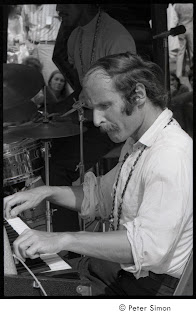A couple of choice items— go read it, it's essential, and very long:
Louis Hayes: “I felt a feeling, really good. It had such a groove, really, really easy to play. It was in a way, uncomplicated. When [Louis] went to the cymbal, whatever he did on the side, never took away that cymbal consciousness. This is that forward driving. He played 16th notes in such a short way, that not only didn’t it interrupt the pulse, it was the pulse.”
“It was the most incredible cymbal beat. He always put those little hiccups in, and it never left the flow. Later on I will tell you about some drummers, they were very great, but whenever they played a transition, the groove, not the GROOVE, but the FEELING [and the] the SOUND of the groove stopped. When you have that simmering and the band is cooking in a simple way, you are accompanying a soloist, it’s very important to be uninterruptive yet very creative, and that takes a hell of an amount of concentration and invention.”
Urgency: “I was never worried about who I was playing with, as long as the bass player and the drummer know how to play together, I’m alright, and the basic concept is some urgency. The urgency for me is, it means, the cymbal beat, which is way on top, and the distance to the beginning of the beat, to the BAP! that backbeat is at the very last moment. That’s very difficult to describe in words – that distance has gotta be like a slingshot effect, between when he hits the cymbal, or any other instrument on the drums, that Boom! that beat, has gotta BAM! it cannot be Bot, it’d gotta be Boom!, have a little anticipation, not even early, it’s just the way you [smacks his hand on the table] slide into it, you know?”
Eric Gravatt: “[T]his was a master musician. He was a writer. But sometimes you get somebody so good he will do anything. He wanted to shape the music. In many ways it was good, and in some ways it was not. At times, where there was supposed to be a crescendo, just for the love of it he would decrescendo, and it kind of drove shit around. So after a while, we said, ‘Maybe, we know this man is great, maybe we try somebody else.’ It’s better sometimes you got somebody who is not that good, but he is totally in the flow of the music.”
Busy drummers: “So when you asked me who took the music the furthest, it was always the guys who played the least. ’cause Wayne and me are highly rhythmic, and the we play off each other, it was always very rhythmic. So we were already percussion players, but then when you go into a transition, and I want to play some harmonic stuff, often I have to lift my hands up, because Omar [Hakim] was there all the time.”
End of interview quotes. I'll add a story Peter Erksine told me, about being in the studio listening to the live recording that would be released as the Weather Report album 8:30. Listening to the tune Black Market, where Wayne Shorter and Erskine play duo, Zawinul said “You're playing pretty good...”, when at 6:47 Erskine jumps on a dotted-quarter note rhythm Shorter is playing, “...until you did that.”
Go to Dave Aldridge's site now, read the whole interview.


No comments:
Post a Comment